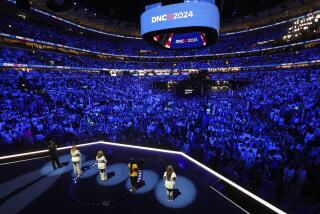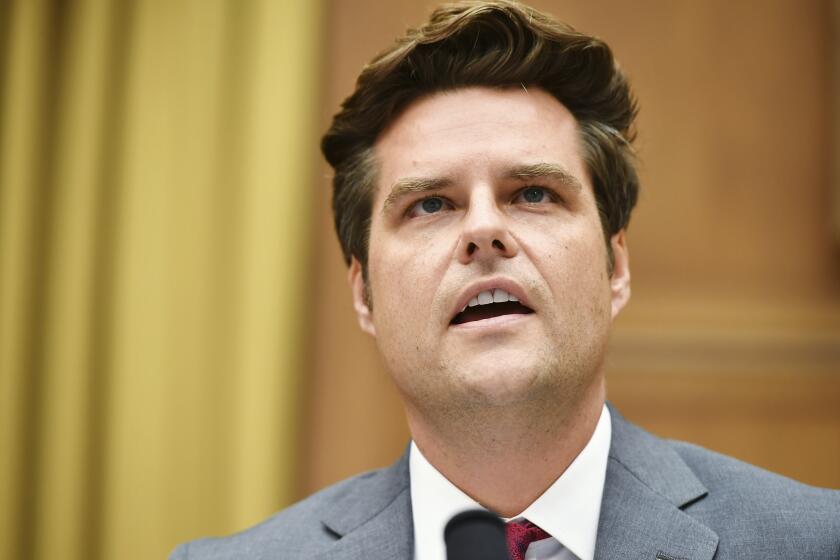Gun lobby’s grip loosens on Congress
WASHINGTON — The gun-control debate sharpened Tuesday as President Obama backed an effort to revive the assault weapons ban spearheaded by California Sen. Dianne Feinstein, who is poised to have a powerful new role as the head of the Senate committee overseeing gun laws.
Calls for federal gun restrictions were mounting following last week’s shooting at an elementary school in Newtown, Conn. -- even from lawmakers who had rejected them in the past. The National Rifle Assn. and its allies have successfully kept such efforts at bay for years, but the slayings of 20 children have roiled the politics of gun control and now challenge the gun lobby’s hold on Capitol Hill.
The NRA broke its four-day silence Tuesday, saying it “is prepared to offer meaningful contributions to help make sure this never happens again,” but offered no details. The group plans to hold a news conference Friday.
The gun lobby faces a newly empowered opponent in Feinstein, a Democrat, who is in line to succeed Sen. Patrick J. Leahy (D-Vt.) as chairwoman of the Senate Judiciary Committee, with the power to call hearings and move new legislation.
Feinstein said Tuesday that on the first day of the next Congress she would introduce an updated version of the expired assault weapons ban that she helped pass in 1994. As drafted, the measure would ban the Bushmaster .223 rifle that Adam Lanza used in the Newtown slayings, which also left six school employees dead.
“This is an uphill climb,” she said. “Sure, it’s tough, but that doesn’t mean we shouldn’t try.”
The issue is personal for Feinstein, who became mayor of San Francisco in 1978 after then-Mayor George Moscone and Supervisor Harvey Milk were shot to death at City Hall. A pen President Clinton used to sign the assault weapons ban hangs prominently in her Capitol Hill office.
Feinstein has the backing of Obama, who vowed Sunday in Newtown to harness the power of his office to try to prevent future massacres.
The president put little effort into gun legislation during his first four years in the White House, despite several mass shootings -- including one in Tucson that left six people dead and 13 wounded. Then-Rep. Gabrielle Giffords, an Arizona Democrat, was shot in the head and nearly killed.
On Tuesday, spokesman Jay Carney said that Obama was “actively supportive” of Feinstein’s effort to reinstate the assault weapons ban, which expired in 2004, and that he would back support legislation to tighten sales at gun shows.
An NRA spokesman declined to comment on the calls for gun control. But the group released a statement saying it was “shocked, saddened and heartbroken by the news of the horrific and senseless murders in Newtown.”
“Out of respect for the families, and as a matter of common decency, we have given time for mourning, prayer and a full investigation of the facts before commenting,” the statement continued.
The gun lobby’s influence is renowned: It easily swept back efforts to toughen federal gun laws after the 2011 mass shooting in Tucson, as well as the July movie theater massacre in Aurora, Colo., that left 12 dead and dozens wounded. Much of the NRA’s power stems from its relentless lobbying and an increasingly polarized House, which is controlled by the group’s Republican allies.
Few doubt the NRA will wield substantial influence in the debate, joined by even more vociferous groups, such as Gun Owners of America, which sees the NRA as too willing to compromise.
Michael Hammond, legislative counsel for Gun Owners of America, said his group wouldn’t retreat an inch from its opposition to restrictions, including a ban on high-capacity magazines like those used in Newtown.
“I think it’s a horrible idea,” he said, saying such magazines are valuable in self-defense. Lanza used magazines that held 30 rounds each.
Hammond noted that gun-rights supporters have faced hostile political environments in the past. After the 1999 shootings at Columbine High School that left 12 students, a teacher and two gunmen dead, he said, “things looked very bleak for the 2nd Amendment community.” Despite the increase in public support for gun control at the time, his group and others turned back efforts to tighten gun laws.
Still, both allies and opponents say the gun lobby faces a much steeper fight this time. Those calling for tougher gun laws include longtime NRA allies, such as Sen. Joe Manchin III (D-W.Va.), who met Tuesday with Feinstein and spoke with Obama by phone.
Susan Ginsburg, who coordinated firearms policy at the Treasury Department during the Clinton administration, says she believes the Newtown massacre will lead to new gun restrictions.
“I don’t think this is going to fade back into invisibility again,” she said. “We seem to have turned a corner in which it’s just not acceptable for children to be killed like that.”
For nearly two years, Reps. Diana DeGette (D-Colo.) and Carolyn McCarthy (D-N.Y.) have pushed a bill to ban ammunition clips that hold more than 10 rounds. The bill didn’t budge, not even after the Colorado theater slayings in July.
On Tuesday, the measure picked up 16 new Democratic cosponsors, including some who have been steadfast opponents of gun restrictions, DeGette said. She plans to press House Speaker John A. Boehner (R-Ohio) to bring the measure up for a vote before the end of the year.
“Any time you’re up against the NRA, you have a fight. But I think the atmosphere has changed,” she said. “I think members of Congress will be hearing from moms and dads in their districts, and I think if we fight hard for this, we will win in the end.”
Supporters of gun rights agreed that the age of the victims, most of them 6 or 7 years old, created a shared sense of national anguish that makes their position particularly delicate.
“This is just the most horrific scenario,” said Richard Feldman, a former NRA regional political director and gun lobbyist who now runs the Independent Firearm Owners Assn. “This puts all gun owners in a defensive position, no question about that.”
Feldman, who has been critical of the NRA in the past, says he believes that “everything should be on the table,” adding: “We should have an adult discussion, not a screaming match, about the role of guns and how best to protect people.”
Both the intense media spotlight on Newtown and Obama’s vow to use the power of his office to prevent future slayings tempers the NRA’s ability to wield power behind the scenes, said Robert J. Spitzer, author of “The Politics of Gun Control.”
“There’s an inverse relationship between the NRA’s influence and how public the controversy is,” said Spitzer, who teaches political science at the State University of New York in Cortland.
Key to the fight will be the group’s efforts to stop legislation in the House.
“It would be a mistake to underestimate their political influence,” Spitzer said. Still, he added, “they’re not invincible.”
The NRA saw mixed results after spending at least $19 million on this year’s election -- including $12 million on a futile effort to defeat Obama. Of the 118 candidates it backed, just 52% won, according to a tally by the Center for Responsive Politics.
And for the first time, the organization faces the prospect of having to counter big money on the other side. Independence USA PAC, a new “super PAC” financed by billionaire New York Mayor Michael R. Bloomberg, defeated three NRA-endorsed candidates last month. Since the Newtown slayings, Bloomberg has called on Obama to push for gun control.
Asked Monday whether he would match the NRA’s spending in future elections, Bloomberg said: “I have no idea, but I’m going to do what I think is appropriate to try to impact the dialogue. Shame on me if I don’t.”
--
Melanie Mason and Christi Parsons in the Washington bureau contributed to this report.
More to Read
Get the L.A. Times Politics newsletter
Deeply reported insights into legislation, politics and policy from Sacramento, Washington and beyond. In your inbox three times per week.
You may occasionally receive promotional content from the Los Angeles Times.











